Facemasks and social distancing will be needed until next summer, the head of Oxford's vaccine trial team said last night.
Andrew Pollard warned strict rules would have to be followed even if global tests proved successful. He said the first jabs would probably not be available until next year – and then only for key groups such as frontline health workers.
Professor Pollard said that he hoped the final trials could be completed by the end of this year but added: 'Life won't be back to normal until summer at the earliest. We may need masks until July.
If we end up with a vaccine that's effective in preventing the disease, that is by far the best way to control the virus. But in the medium term, we'll still need better treatments. When does life get back to normal? Even if we had enough vaccine for everyone, in my view it's unlikely that we're going to very rapidly be in a position where the physical distancing rules can be just dropped.
'Until we've got a high level of immunity in the population so that we can stop the virus so most vulnerable people are immune, there is going to be a risk. Initially, we're going to be in a position where mask-wearing and social distancing don't change.
'Only when there is a big drop in serious cases will governments feel able to relax these measures. This is a very easily transmissible virus.'
The Oxford University vaccine, produced with drugs giant Astrazeneca, is one of only nine to have reached phase three trials, the final stage before implementation, and is widely seen as the leading candidate to deliver.
In his remarks to an online seminar with Oxford alumni, Professor Pollard explained that, if successful, the vaccine will need approval from the Medicines and Healthcare products Regulatory Agency.
He said: 'Once we have the trial results, I can't imagine they will do that overnight.
'They will have to scrutinise the data very carefully – the public would not expect any less.'
The final evaluation, he said, is likely to take weeks, even though he and his team have begun a 'rolling programme' to give the regulatory agency access to the trials while in progress.
Rolling out the vaccine will pose a 'huge logistical challenge', the professor pointed out.
In his remarks to an online seminar with Oxford alumni, Professor Pollard explained that, if successful, the vaccine will need approval from the Medicines and Healthcare products Regulatory Agency.
He said: 'Once we have the trial results, I can't imagine they will do that overnight.
'They will have to scrutinise the data very carefully – the public would not expect any less.'
The final evaluation, he said, is likely to take weeks, even though he and his team have begun a 'rolling programme' to give the regulatory agency access to the trials while in progress.
Rolling out the vaccine will pose a 'huge logistical challenge', the professor pointed out.
Oxford's vaccine is based on a genetically engineered type of coronavirus that gives chimpanzees a form of the common cold.
Trials of the jab involve 20,000 volunteers in Britain and other countries being given either the vaccine or a harmless placebo.
Professor Pollard said early results had shown that the vaccine causes the body to make antibodies against Covid, and that these last for at least three months.
Tests on volunteers given the jab in April will soon show whether they lasted for six months. 'The evidence so far in the lab is that the antibodies are able to stop the virus in its tracks,' said Professor Pollard.
At least one person in the trial has become seriously ill, and has had to be hospitalised with the disease, he added.
Kate Bingham, head of the UK Vaccine Taskforce, said there was only a 'slim' chance the Oxford jab could be ready by Christmas.
She said she felt optimistic from the data seen so far in trials. But she warned against assuming a Covid-19 vaccine would be better than flu jabs, which are only around 50 per cent effective.
'It's most likely that it'll be next year,' she added.



There are going to be revolutions, revolutionary situations, and general political crises for the ruling class across the world as the working class fights back against untenable austerity conditions.
This process has already been unfolding and evident in the aftermath of 2008. Like in Lebanon, they’ve overthrown two governments in the past year. In the past 2-3 years there have been revolutionary situations and mass uprisings in Haiti, Chile, Puerto Rico, Colombia, Ecuador, Sudan, Iraq, Tunisia, Indonesia, Nigeria, France, the United States, and others.
What is still missing is an international, revolutionary political leadership for the workers of the world.
There’s not a linear path whereby capitalism declines into fascism, especially when class struggle has come roaring back internationally and workers are stepping onto the stage of history.
You are living in fantasy land if you truly think there is going to be a revolution in the US or anywhere in the West.
The left is very, very small here. We waste most of our time infighting with identity politics and other nitpick bullshit. The only way a revolution is possible here is if you build a working class movement, and we absolutely don't have that, cause the left here has bought into the liberal ID-POL nonsense and divided the working class by race and other subdivisions.
Fascism is far more likely in the US. The far right have their shit together and they've had decades to prepare and wait for this moment. At most, we're going to end up with a handful of small left groups, who will be outnumbered and likely outmatched by all the fascists in the US.
There will be revolutions in Africa long before it happens in the West. Fascism is already on the rise in Europe. Hungary elected a fascist not too long ago and France has Le Pen who just might very well win the next election. There is no big left in the west cause neo-liberalism has spent decades squashing it and what little bit of the left they didn't kill off, we've cannibalized ourselves with identity politics.
We don’t “build” class struggle, class struggle exists independently of anything the left does, by virtue of the antagonisms and limitations of capitalism.
Fascism is absolutely not more likely in the US—the class basis for a mass fascist movement just isn’t there. Your unprincipled take on Idpol causes you to overlook that the biggest protest movement in US history, and against racism, happened fairly spontaneously this summer. While the right wing, who “have their shit together and they’ve had decades to prepare and wait for this moment” have been dramatically outnumbered. Like outnumbered by 100-1 or more in the aggregate. Outnumbered by counter protestors at basically every rally they have within driving distance of a metro area.
Not to mention polling shows that something like 50% of people under the age of thirty in the US are sympathetic to “socialism” whatever that means to them.
Your job, if you’re actually a Marxist (which I think you have some pretensions towards being), is to connect and build inroads into the working masses, their movements and organizations, and steer them towards a conscious class struggle perspective. It’s not to complain that people aren’t popping out of the womb as trained Marxist cadre.
You’ve declared defeat before you’ve done anything, because you look out on the world and ignore reality, and you’re blaming it on idpol. That’s like chud-level analysis.
your statement on idpol is absurd. How can you say idol divides the working class when the whole point of idpol is to include the whole working class, you can't have an undivided working class unless you include poc, women, and everyone else! Consider, who is really dividing the working class, the racists, sexists, ect who are actively pushing away workers, or the people trying to include everyone. It is a tried and true method of capitalism to divide the working class by encouraging racism, etc so they don't develop class consciousness, we must dismantle these unjust institutions for the workers to be able to rise up as one.
sadly I think you are right on all other accounts. though I believe there will be revolution in the west but not in my lifetime.